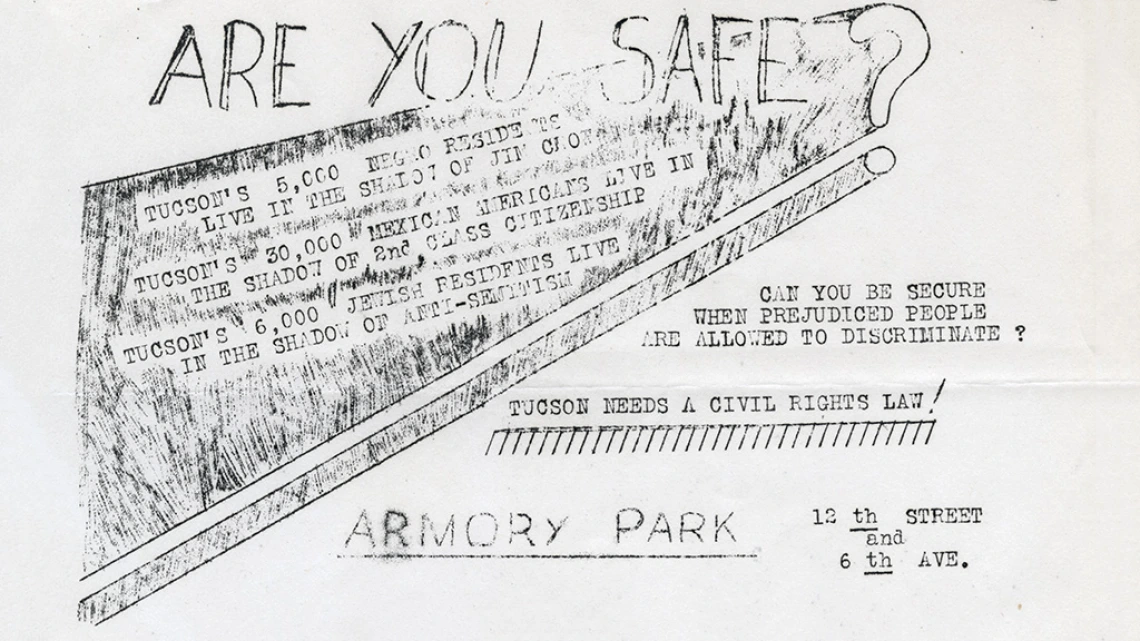Tucson Council for Civic Unity records

Civil rights rally flyer for event held in Armory Park; Tucson, Arizona, 1949.
Collection area: Arizona and Southwest
Collection dates: 1948-1966
The first subgroup, the Tucson Council for Civic Unity records, pertains to the council's activities in Tucson and in the state legislature to achieve its mission. Historical information includes the constitution and by-laws, and background information about TCCU. Board of directors lists, 1948-1965, meeting minutes from 1951-1965, and treasurers' reports from 1951-1962 are included. Correspondence on general matters is divided into two folders. Membership files are divided into membership lists and membership meeting minutes, both arranged chronologically from 1948-1965. Membership lists from 1961, 1962 and 1964 are missing. There is also a file of internal memos, meeting notices and a few newsletters sent to members. Various programs, conferences and committees sponsored or cosponsored by TCCU, 1950-1964 are arranged in folder. A series of subject files covers Tucson organizations and civil rights activities during 1949-1964; Arizona civil rights legislative activities from 1948-1965; regional and national organizations; and supplemental files of newspaper clippings from 1948-1965, and including related publications in comic book formats of civil rights issues, one featuring Martin Luther King.
The second subgroup of records involves the Arizona Council for Civic Unity, 1947-1960. These few files are incomplete. Included are Board of Directors lists, 1948-1957 [lacking 1950-1953 and 1955] ; the meeting minutes from 1948-1958 [these too are incomplete] ; Financial records, 1950-1952, are mostly tax information. Both incoming and outgoing correspondence is filed. The bulk of this correspondence is with Louis Wirth and Louis Hosch of the American Council on Race Relations and Fred Holmes regarding the early development of ACCU; and between Fred Holmes and Executive Secretary Rosamond Spicer. A few newsletters from 1948-1958 are also present here. A supplemental group of files, containing a historical file, 1947-1949; a file on Greater Phoenix Council for Civic Unity, and a miscellaneous file are included as well.
Tucson Council for Civic Unity (TCCU) was dedicated "to foster and promote better understanding and relations among people of various racial, religious, social and national backgrounds in Arizona and to promote better conditions among all groups with respect to education, housing, employment, recreation, health and other community problems." It was affiliated with the Arizona Council for Civic Unity (ACCU: incorporated December 21, 1948). The Greater Phoenix Council for Civic Unity was another local agency for the ACCU.
ACCU's founder was Dr. Fred G. Holmes, whose interest in initiating this agency was triggered by President Truman's Commission on Civil Rights' report of 1946, To Secure these Rights. During 1946-1947, Holmes worked with Louis Wirth and Louis E. Hosch of the American Council for Race Relations in Chicago on planning the Arizona Council for Civic Unity. Many well-known Tucsonans were involved with TCCU over the years, including Morris and Stewart Udall, Mr. and Mrs. Morgan Maxwell, Maria Urquides, Rabbi Bilgray, Dorothy Barber, Laura Banks, Thomas Bahti, Harry Gin and Sam Goddard.
The Council contributed to several achievements including the desegregation of Tucson public schools, 1948-1951, and repeal of school segregation laws in Arizona; the passage of the Equal Employment Opportunity bill, 1955; the creation of the Human Relations Commission, 1955; and in many daily local battles against racial and religious discrimination. TCCU's longest struggle was for the passage of the Public Accommodations legislation in the Arizona State Legislature. The effort lasted from 1949-1965, when the Civil Rights bill was finally enacted.
A collection guide explains what's in a collection. New to using our collections? Learn how to use a collection guide.
Collection guideAccess this collection
Visit us in person to access materials from this collection. Our materials are one-of-a-kind and require special care, so they can’t be checked out or taken home.
How to cite
Learn how to cite and use materials from Special Collections in your research.
